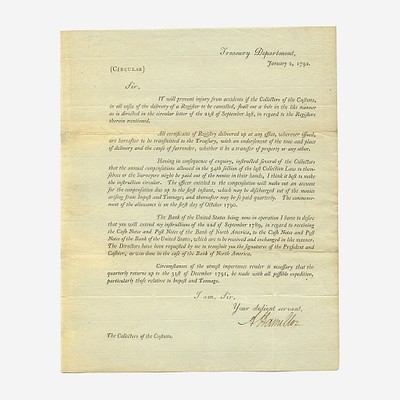[Hamilton, Alexander] [Treasury Department] Letter, signed
About Seller
2400 Market St
Philadelphia, PA 19147
United States
Established in 1805, Freeman’s Auction House holds tradition close, with a progressive mind-set towards marketing and promotion, along with access to a team of top experts in the auction business. And now with offices in New England, the Southeast, and on the West Coast, it has never been easier to ...Read more
Two ways to bid:
- Leave a max absentee bid and the platform will bid on your behalf up to your maximum bid during the live auction.
- Bid live during the auction and your bids will be submitted real-time to the auctioneer.
Bid Increments
| Price | Bid Increment |
|---|---|
| $0 | $25 |
| $500 | $50 |
| $1,000 | $100 |
| $2,000 | $200 |
| $3,000 | $250 |
| $5,000 | $500 |
| $10,000 | $1,000 |
| $20,000 | $2,000 |
| $30,000 | $2,500 |
| $50,000 | $5,000 |
| $100,000 | $10,000 |
About Auction
Oct 25, 2021
Freeman's is honored to present The Alexander Hamilton Collection of John E. Herzog, a single-owner sale of Alexander Hamilton material, on October 25. Curated by Darren Winston, Head of the Books and Manuscripts Department. Freeman's info@freemansauction.com
- Lot Description
[Hamilton, Alexander] [Treasury Department] Letter, signed
(Philadelphia), April 5, 1792. One sheet, 7 7/8 x 7 1/2 in. (200 x 190mm). Manuscript letter in a secretarial hand, signed by Alexander Hamilton as first Secretary of the Treasury, to Joseph Howell, Esq., accountant at the War Department: "I request that you will furnish me/with certified pay rolls of the balances due to sundry/Officers of the Maryland line for the years 1782 & 1783/amounting to Dollars 406.66 and of balances of 4/Months pay of the year 1783 due to the Non Commissioned/Officers and privates of the said line as per statement/of the 10th of July 1787 amount Dollars 9678.85/These balances were stated on the 16th page of the/last appropriation..." Creasing from original folds, separations along edges of same; three tape repairs along folds verso.
Upon the passage of the Assumption Plan in 1790, the Federal government proceeded to settle state accounts for expenses incurred during the Revolution. As William G. Anderson observes in The Price of Liberty: The Public Debt of the American Revolution, "All the states put forth their muster rolls, receipts, account books, etc., to document their expenses in the war. When computations were completed in 1793 seven states�New Hampshire, Massachusetts, Rhode Island, Connecticut, New Jersey, South Carolina, and Georgia�were found to be creditors to the amount of $3,517,584, while the other six states were debtors of the same amount..." It is presumed that Hamilton was requesting the above information from Howell in his attempt to make his calculations to put his assumption plan into place.
Joseph Howell, Jr., of Pennsylvania (1750-98), served as a captain in the Continental Army from 1776 to 1778. He was appointed auditor of the Army by Congress in 1779 and held that post until it was abolished in 1781. In 1783, Congress appointed him deputy to John Pierce, the paymaster general and commissioner of Army accounts, whom he succeeded upon Pierce's death in 1788. In the early years of George Washington�s administration, Howell served as acting paymaster of the Army and in 1792 became accountant to the War Department, a post he occupied until his resignation in 1795. Howell was a member of the Pennsylvania chapter of the The Society of Cincinnati, a fraternal organization of Revolutionary War soldiers. George Washington served as the Society's first president, and was succeeded by Alexander Hamilton upon his death in 1799.
Henkels, Sale of the Important Collection of Valuable Autograph Letters and Historical Documents. Belonging to J. Edward Powell, 1927
- Shipping Info
-
No lot may be removed from Freeman’s premises until the buyer has paid in full the purchase price therefor including Buyer’s Premium or has satisfied such terms that Freeman’s, in its sole discretion, shall require. Subject to the foregoing, all Property shall be paid for and removed by the buyer at his/ her expense within ten (10) days of sale and, if not so removed, may be sold by Freeman’s, or sent by Freeman’s to a third-party storage facility, at the sole risk and charge of the buyer(s), and Freeman’s may prohibit the buyer from participating, directly or indirectly, as a bidder or buyer in any future sale or sales. In addition to other remedies available to Freeman’s by law, Freeman’s reserves the right to impose a late charge of 1.5% per month of the total purchase price on any balance remaining ten (10) days after the day of sale. If Property is not removed by the buyer within ten (10) days, a handling charge of 2% of the total purchase price per month from the tenth day after the sale until removal by the buyer shall be payable to Freeman’s by the buyer. Freeman’s will not be responsible for any loss, damage, theft, or otherwise responsible for any goods left in Freeman’s possession after ten (10) days. If the foregoing conditions or any applicable provisions of law are not complied with, in addition to other remedies available to Freeman’s and the Consignor (including without limitation the right to hold the buyer(s) liable for the bid price) Freeman’s, at its option, may either cancel the sale, retaining as liquidated damages all payments made by the buyer(s), or resell the property. In such event, the buyer(s) shall remain liable for any deficiency in the original purchase price and will also be responsible for all costs, including warehousing, the expense of the ultimate sale, and Freeman’s commission at its regular rates together with all related and incidental charges, including legal fees. Payment is a precondition to removal. Payment shall be by cash, certified check or similar bank draft, or any other method approved by Freeman’s. Checks will not be deemed to constitute payment until cleared. Any exceptions must be made upon Freeman’s written approval of credit prior to sale. In addition, a defaulting buyer will be deemed to have granted and assigned to Freeman’s, a continuing security interest of first priority in any property or money of, or owing to such buyer in Freeman’ possession, and Freeman’s may retain and apply such property or money as collateral security for the obligations due to Freeman’s. Freeman’s shall have all of the rights accorded a secured party under the Pennsylvania Uniform Commercial Code.
-
- Buyer's Premium



 EUR
EUR CAD
CAD AUD
AUD GBP
GBP MXN
MXN HKD
HKD CNY
CNY MYR
MYR SEK
SEK SGD
SGD CHF
CHF THB
THB![[Hamilton, Alexander] [Treasury Department] Letter, signed](https://s1.img.bidsquare.com/item/l/9470/9470957.jpeg?t=1MwoES)
![[Hamilton, Alexander] [Treasury Department] Letter, signed](https://s1.img.bidsquare.com/item/s/9470/9470957.jpeg?t=1MwoES)










